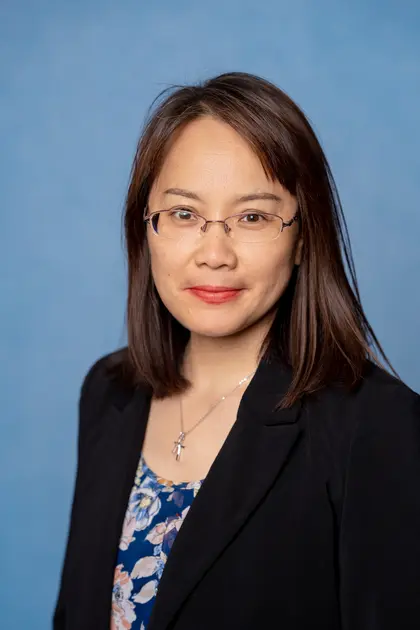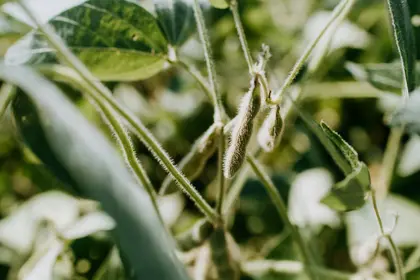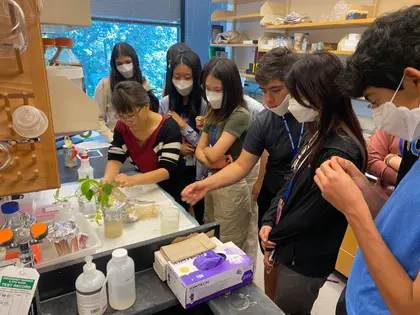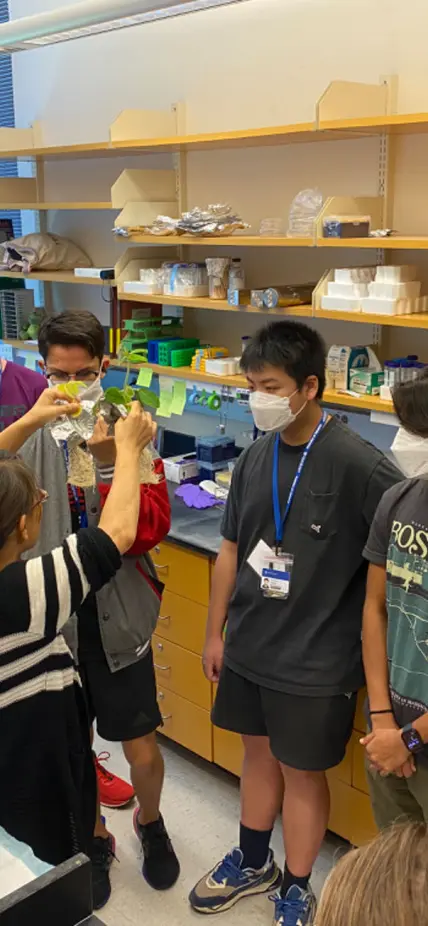
Q: Did you always think you would be a scientist?
I was born with a thirst for knowledge and curiosity about nature. From a young age I dreamed of being a scientist, but it wasn’t until I went to college—I’m a first-generation college student—that I really saw the path to get there.
Q: What is the coolest thing you’ve worked on so far in your career?
While a lot of microbiologists focus primarily on pathogenic microbes—the kind that cause diseases and viruses like Covid-19—I’m proud that my research centers on beneficial microbes, in particular beneficial bacteria. In many ways the word “bacteria” has a negative connotation, but there are so many bacteria that are enormously advantageous. One example is bacteria used to produce antibiotics, which are a cornerstone of modern medicine and critical in the treatment of infection. There are also beneficial bacteria involved in the remediation of heavy metal pollution in soil, caused by such human activities as industrial pollution, waste disposal, and mining. These beneficial bacteria help to restore the soil’s health and fertility. Yeast, which is more of a beneficial fungus than bacteria, is instrumental in the fermentation of foods and beverages like bread, beer, and yogurt, to name a few. Finally, my current research focuses on a type of bacteria called rhizobia that grows on the root nodules of legumes like beans, soybeans, and peas. These bacteria are essential to a process called biological nitrogen fixation, whereby they convert atmospheric nitrogen—a vital nutrient the plants cannot obtain from the air themselves—into ammonia, which is essential to plants’ development and growth.
Q: What do you think is the most exciting research direction happening in your field right now?
The thing I am most excited about right now is research being done around Engineered Nitrogen-Fixing Nodule Symbiosis. Currently, the process of biological nitrogen fixation in root nodules occurs in legume crops via the symbiotic relationship they have with rhizobia bacteria. Rhizobia don't engage in nodule symbiosis on the roots of other important crops like corn, sorghum, rice, and wheat. These crops also need significant amounts of nitrogen to grow, and since they can’t obtain it sufficiently from the soil, farmers have to rely on synthetic nitrogen fertilizers, which emit a greenhouse gas called nitrous oxide into the atmosphere. This is a major source of pollution and a threat to the health of our ecosystem and climate.
To solve this, scientists in my field are researching how to engineer the nodule formation, or colonization, mechanism of rhizobia bacteria on non-leguminous crops. This would allow them to naturally fix nitrogen from the atmosphere like legumes do, serving as a sustainable alternative to synthetic nitrogen fertilizers. We’re making progress, but we’re not there yet.
Q: Looking 10 years ahead, what future development do you think will have the greatest impact on your field?
In the field of genome engineering, there is a highly-efficient technology called CRISPR/Cas9 that can target specific stretches of genetic code and modify DNA at precise locations. This tool, which can create mutated genes, has many applications including the treatment of genetic diseases. As of now, though, this technology works efficiently in legume hosts, such as soybean and cowpea, but not rhizobia. Scientists are working toward the ability to modify this technology to rhizobia and that development will significantly improve research in my field.
Q: Was your love of science shaped by a particular experience or mentor?
I think I was originally drawn to agricultural science, in general, because my parents are farmers in China, where farming is extremely labor intensive. In the United States, agriculture and farming are greatly benefited by sophisticated tools and advances in technology. But my parents didn’t have those advantages. So, I found myself wanting to study ways of making farming and agriculture more efficient.
My specific interest in studying beneficial bacteria was shaped by a number of internships I did during undergrad where I majored in bioengineering. One of my very first internships revolved around experimentally isolating microbes—including bacteria and fungi—in the soil, and I became very interested in identifying and understanding their function. Before then, I had no idea that beneficial bacteria or microbes even existed in the soil. I also did internships in a beer factory, where I learned more about yeast, as well as at a pharmaceutical company that produces antibiotics. These different experiences gave me a really broad sense of how bacteria can be used for good, and this set the stage for my scientific pursuits.

Q: Do you have a favorite plant and why?
I think given everything I’ve already said here, it’s probably apparent that legumes are my favorite plants. I am really interested in the beneficial communication between plants and microbes. It’s amazing that, much like human communication, plants and microbes talk to each other. Instead of words, however, their language is chemicals. As scientists, we use a model to study why and how they talk to each other, what the communication signals are, and how they form endosymbiosis, which is when one organism lives inside the cell of another organism for their mutual benefit. This goes back to rhizobia bacteria and legumes and how the communication between the two triggers nitrogen fixation. Something I really love about the kind of research I do with soybean crops is that, unlike theoretical model systems used in other fields of science, the models we use give us actual tools we can apply in the real world to improve crop productivity—to make a real difference.
Q: Who is your “Science Superhero?”
That would be the "Father of Hybrid Rice," Longping Yuan, a very famous Chinese agronomist who first developed hybrid rice varieties in the 1970s. Rice is naturally produced through self-pollination, with the male and female existing in the same plant. Unfortunately, though, the production or crop yield of rice is low through self-pollination, which is problematic for a country with such a large population. Through his research and experiments, Yuan identified naturally-mutated male rice varieties that could be used to cross-breed with female rice to create hybrid rice. This and other experimental work with cross-breeding rice resulted in a 20 to 30 percent increase in crop yields, vastly improving the country’s food security. In fact, his work allowed China to sustain 20 percent of the global population on just 9 percent of arable land. In 2004, Yuan was awarded the World Food Prize and World Prize in Agriculture.
Q: What are some of the challenges you have encountered in your career so far and how did you address them?
I love science so much, but I think there are certain inherent challenges for women in this field, especially if you have a family. I have a son who is 11 and a six-year-old daughter. I work long hours, so managing my time is a juggling act. I have to really focus on being as efficient as possible in the lab to allow time for my family and establish a healthy work-life balance. No matter how hard I try, though, it feels like there is never enough time. I have had to learn to ask friends and family for help, and am fortunate and very grateful that my parents-in-law are able to help a lot with childcare. So many women who don’t have that extra help quit after their Ph.D.s or postdoc programs, because they have to take care of their children. So, it’s very rare for women to become principal investigators, or P.I.s leading projects.
An added challenge is the financial piece, because postdoc salaries are relatively low. I love my academic job, but I also need to be able to provide for my family and create a better life for my children. On top of that, it’s very hard for international students to get federal funding, especially if you don’t have a green card. My P.I. has been very generous in offering funds to support my research.
Q: What advice would you give to graduate students and others who are just starting their scientific careers?
First of all, think independently, especially when you become a graduate student. When you’re in undergrad, it’s all about learning from textbooks and teachers. When you transition to grad school, it’s important to think for yourself. Don’t believe everything you hear or read—even textbooks can be wrong. Do your own research, use resources, ask questions, look at the work other scientists are doing in your field. Investigate and experiment to prove your hypotheses. Don’t be afraid to come to your own conclusions, even if they don’t align with the consensus.

Also, networking is very important for a number of reasons. For example, the equipment in your own lab might be limited, but if you communicate with fellow graduate students working on other studies and in different labs, you may get good suggestions, as well as access to new equipment, tools, and protocols that will benefit your research. Some important experiments of my dissertation were done in cooperation with other labs, because I needed equipment that my department didn’t have. Expanding my network and talking to peers from other facilities helped me move my work forward, learn communication skills, and form good connections. Another form of networking is attending conferences and talking to people who are doing similar research. Don’t hesitate to ask them questions, discuss challenges you are facing in your work, and lean on their expertise.
Finally, I want to talk about the culture shock that many feel as international students. For those whose first language is not English, it can be a significant struggle to communicate and make friends with people from different backgrounds. Often, in meetings or while having meals, international students tend to gravitate toward people from their home country, rather than make new connections. In my experience, this can make you feel isolated and can lead to depression, and a lot of people feel ashamed to ask for help with depression. Not opening up, however, makes things worse. So my advice to anyone going through this is to ask for help. There are a lot of resources and facilities on campus, including mental health services, that are there for the sole purpose of helping. Don’t be afraid to reach out. You can also lean on friends. I find that sometimes all you need is someone to listen. Or you can ask peers for advice. Another great resource are scientists with seniority who have similar backgrounds and have been through the same thing. They have a lot of wisdom from learned experiences that they can share.
Q: Why did you decide to do a postdoctoral position at Carnegie?
I was drawn to Carnegie because of the compelling research my P.I., Brittany Belin, is doing in beneficial plant-microbe interaction.
Q: What has your experience at Carnegie meant to you?
Carnegie offers fantastic training, an environment that supports me and my ideas, and a lot of freedom to pursue the things that interest me. I also feel that others genuinely appreciate my work, which has given me a lot of confidence. Even when I feel challenged, I am surrounded at Carnegie by a strong network of friends and peers who offer great advice and are eager to help in any way. It’s just an amazing community and I know my experience here will be instrumental to my professional development and in paving the way for my future career.
